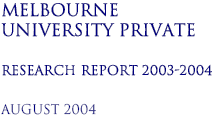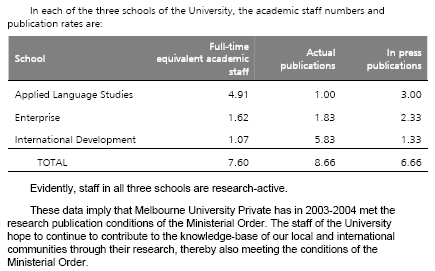 What's
in a Name? -- The Issues Paper, Melbourne University Private and the California
Institute of Technology (Caltech). (March 7, 2005)
What's
in a Name? -- The Issues Paper, Melbourne University Private and the California
Institute of Technology (Caltech). (March 7, 2005)
|
News & Views item - March 2005 |
![]()
 What's
in a Name? -- The Issues Paper, Melbourne University Private and the California
Institute of Technology (Caltech). (March 7, 2005)
What's
in a Name? -- The Issues Paper, Melbourne University Private and the California
Institute of Technology (Caltech). (March 7, 2005)
With the publication last week by the Minister for Education, Science and Training, Brendan Nelson, of the Issues Paper, Building University Diversity: Future approval and accreditation processes for Australian Higher education, the balloon went up.
Various groups within the publicly funded higher education sector voiced alarm, other grudging acceptance, while a few advocates representing private interests were supportive of change that would allow them access.
So far not one voice has been raised with regard the primary issue facing Australia's universities, their progressive decay, i.e their falling further behind the world's best and thereby reducing the nation's ability to compete with those at the top of the OECD. In short where is the Issues Paper that should have been released -- Upgrading Australia's Universities: Determining the requirements for building Australia's best possible system of higher education.
And the result so far has been has been a barrage of verbiage fixated on who or what should be allowed to use the term "university", should we have research only and teaching only universities as well as the current system where all universities are expect to perform both.
David Lloyd is president and chief executive of Melbourne University Private. In his March 7 opinion piece for The Sydney Morning Herald he make some telling if obvious points.
...some universities in Australia are better than others already. Measured against some states' strict interpretation of the ministerial council's protocols now, some would struggle to win university status. But we mass-baptised these institutions when the protocols were written and then pretended they were all the same.
The existing universities should never have been forced to put out the myth that all Australian universities are exactly as good as one another - they don't believe it themselves and nor do their students.
Just for the record the Macquarie Dictionary defines "university" as "1. an institution of higher learning, conducting teaching and research at the undergraduate and postgraduate level."
And in

the statement on page 1 reads:
Under the provisions of the Tertiary Education Act 1993, on 3 July 2003 the Minister for Education made an order approving the operation of Melbourne University Private Limited as a university, subject to certain conditions. One of the conditions is that, by July 2004, the University provide evidence of at least one peer-reviewed, externally published research output each year per equivalent full time academic staff member (our emphasis). The research output is to meet the specifications laid out by the Commonwealth Department of Education, Science and Technology (sic) (DEST) for its research data collection exercises. This is the first report of Melbourne University Private against this condition.
and to demonstrate its fulfilment of its obligation MUP presents the following table:

It would appear that meeting the current requirements for receiving the right to be called "university" in Australia is a doddle.
Dr Nelson and his teaching only universities, indeed.
However, for some, a few, a very few of Australia's universities to become great -- that's no doddle, that requires resources, human and infrastructure, and to get and keep top grade humans you need top grade infrastructure, and to achieve top grade infrastructure you need to provide sufficient resources and that this government has no intention of providing and so far sufficient well heeled philanthropists haven't fronted.
Oh yes, to get back to what's in a name:
Cal Tech
Faculty & Staff Statistics
Faculty in residence (as of December 2004)
Professorial faculty 283
Emeriti 101
Research faculty 62
Other faculty 41
Visiting faculty 87
Postdoctoral scholars 535
Senior postdoctoral scholars 38
Visitors 114
Employees as of December 2004
Campus (excludes faculty and students) 2,671
JPL (excluding contractors) 5,391
Honors & Awards (as of February 2005)
Caltech faculty and alumni have received wide recognition for their achievements in science and engineering.
Nobel Prize: 30 recipients, 31 prizes
Crafoord Prize: 5 recipients
National Medal of Science: 47 recipients
National Medal of Technology: 10 recipients
California Scientist of the Year: 14 recipients
Fellow, American Academy of Arts and Sciences: 77 faculty
Member, National Academy of Sciences: 67 faculty
Member, National Academy of Sciences, Institute of Medicine: 3 faculty
Member, National Academy of Engineering: 30 faculty
A full list of Caltech Nobel and Crafoord laureates can be found at
http://www.caltech.edu/nobel-crafoord
Brief bios of Nobel Laureates are available at
http://pr.caltech.edu/events/caltech_nobel/.
Student & Alumni Statistics
Enrollment (first term 2004)
Undergraduate students:
614 men
282 women
Graduate students:
920 men
356 women
Total students: 2,172